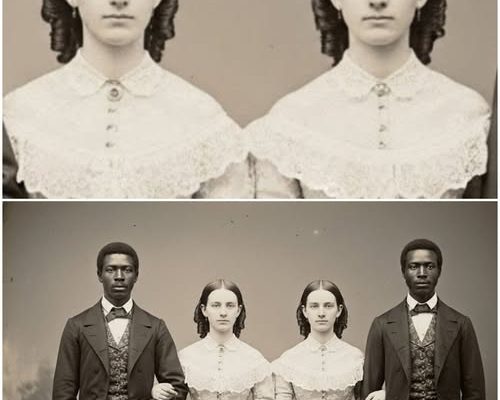In a time when slavery in America defined every social and moral boundary, a shocking tale emerged from Georgia’s antebellum South—the story of twin sisters who made an unthinkable choice. In 1847, they defied their families, their community, and the law itself by marrying the very men society had enslaved.
Family games
This secret pact was more than an act of rebellion—it was a declaration of forbidden love, a story of courage that history tried to bury. But as new research brings this narrative back into light, the legacy of these women reveals how love and resistance once walked hand in hand in the darkest corners of the Old South.
A Historical Context
To understand the gravity of this story, we must first grasp the world these women lived in. Slavery in the 19th-century South wasn’t just an institution—it was the foundation of society, law, and power. Every aspect of life revolved around the ownership of human beings.
But hidden beneath the brutal structure of plantation life were stories that defied its logic. Amid the cruelty, bonds formed—sometimes secret, sometimes dangerous—that crossed the rigid racial divide. And for two Georgia twins born into privilege, those bonds would become life-altering.
Gift baskets
Raised in a wealthy plantation household, the sisters lived lives of luxury and expectation. They were educated, refined, and promised to wealthy suitors who could strengthen their family’s standing. Yet, their hearts chose a different path.
The twins fell deeply in love with two enslaved men who worked on their father’s estate. What began as quiet admiration turned into a connection that neither could deny. It was love born in shadows—a love that risked everything.
The Forbidden Pact
In 1847, the twins made a decision that would forever alter their destinies—they married their enslaved partners in a secret ceremony under the cover of night. The act was unthinkable for their time. To marry a man who was considered “property” was to reject the very foundation of Southern society.
Their forbidden marriage symbolized more than affection—it was an act of rebellion against an empire built on control and subjugation.
The sisters knew the risks: exposure could lead to violent punishment for their husbands and ruin for themselves. Yet, they stood firm. In choosing love, they declared that human connection mattered more than social power or racial law.
Their dual existence—daughters of privilege and wives of enslaved men—forced them into secrecy. To the world, they played the role expected of them; in private, they lived a love condemned by the world around them.
The Impact of Their Choices
The choice to marry across the boundaries of race and slavery shook every moral expectation of their time. The twins’ silent defiance questioned the very core of white supremacy and the hypocrisy of “Christian morality” in the South.
Through their actions, they humanized the enslaved, giving faces, feelings, and dignity to those society sought to dehumanize. Their love story whispered a dangerous truth: that no law could truly govern the human heart.
But the price was steep. Their relationships brought shame upon their families, whispers among neighbors, and constant danger. They lived in fear of exposure, yet they refused to abandon their husbands. The courage they displayed challenged every hierarchy that slavery depended upon.
A Legacy of Love and Resistance
Over time, their secret story faded into the folds of history, preserved only in scattered family letters and local accounts. Yet, their legacy endures—a testament to the power of love as resistance.
Their story reminds us that even in an age of oppression, love defied chains, and human dignity found ways to survive. These sisters were not just symbols of romance; they were pioneers of moral defiance, standing against a system designed to silence them.
In later years, stories of their marriages circulated quietly among abolitionist circles, serving as a haunting example of what the institution of slavery truly tried to destroy—the right to love freely.
Conclusion: A Story Worth Remembering
The tale of the Georgia twins who married their enslaved husbands is a story of courage, conviction, and defiance. It forces us to confront the moral contradictions of America’s past and the power of love to challenge injustice.
As debates about race, equality, and history continue to shape our modern world, this story stands as a reminder that the human heart can rebel against even the harshest systems.
Their forbidden vows, whispered in the darkness of 1847, still echo through time—reminding us that true love has always been revolutionary.



